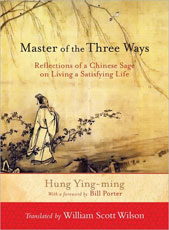Master of the Three Ways was written by Hung Ying-ming, a seventeenth century sage with a deep appreciation of harmony, gentle and simple living, honesty, kindness, and much more. Hung Ying-ming's 357 verses are lyrically delivered in a cogent translation by William Scott Wilson who notes in the introduction that the book is divided into two sections: 1) on dealing with the art of living in society and 2) on the value of solitude and delight in the natural world. It is not too far off the mark to suggest that this book is a forerunner of the present era of interspirituality. Ying-ming's wisdom is an outgrowth of his understanding, appreciation, and living of Zen Buddhism, Confucianism, and Taoism — the Three Ways.
On these pages, you will discover the antidotes to the major "character disorder" of our times: the pushy, greedy, self-absorbed, combative, and insensitive ego. Selfishness rather than the humility is the cause of the incivility of our times where misbehaving, dissing, and lack of etiquette reign supreme. Ying-ming counsels us to hold our tongues when the impulse to gossip overtakes us, to put others ahead of us, to take the high road of integrity rather than giving into greed, and to tolerate the mistakes and flaws of others.
Here are two examples of these wisdom quotations:
• "When in a place of wealth and rank,
Pay attention to the suffering of the poor and humble.
During the time of your youth and vigor,
Guide your thoughts to the hardships of the old and feeble."
• "Fame and honor —
These are not things you should assume only for yourself
If you divide these up and confer them on others,
You will be able to keep harm at a distance and make yourself replete.
Disgraceful conduct and ill repute —
These are not things you should thrust onto others.
If you will lighten others' burdens and ascribe them to yourself,
You will be able to veil your own brilliance and cultivate virtue."
